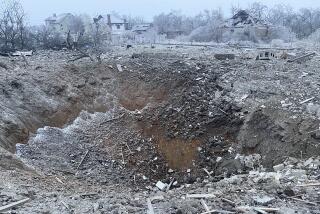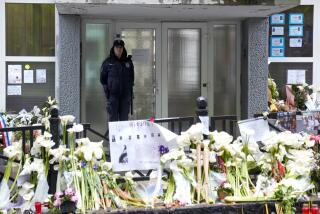Both Sides Get U.N. Ultimatum Over Sarajevo : Balkans: Warning of impending NATO air strikes issued to Bosnian government and Serbs.
- Share via
SARAJEVO, Bosnia-Herzegovina — After a day of vicious battles that shook the city, the United Nations issued an ultimatum Wednesday to the Bosnian government and besieging Serbs: Stop fighting around Sarajevo or face NATO air strikes.
Tanks, cannons and mortars bombarded the capital and its outskirts, killing at least six people and injuring dozens in clashes that followed the failure of a U.S. diplomatic effort to further isolate the Serbs.
The U.N. commander in Bosnia-Herzegovina, British Lt. Gen. Rupert Smith, gave the Serbs until noon local time today to return four heavy weapons they’d taken from U.N. storage depots. All other heavy weapons in a 12 1/2-mile zone around the Bosnian capital must be cleared out or turned in to the United Nations by noon Friday.
“Failure to comply with either deadline will result in the offending party or parties being attacked from the air,” Smith said.
Many heavy weapons--including tanks, artillery, mortars and perhaps rockets--were used in Wednesday’s fighting, although it could not be determined whether the four Smith singled out were among them.
The last North Atlantic Treaty Organization attack near Sarajevo was Sept. 22, 1994, when U.S. and British jets went after a Serbian tank that was firing at U.N. peacekeepers.
Wednesday’s explosion of fighting seemed linked to the failure of a U.S. effort to drive a new wedge between the Bosnian Serbs and their former mentor, Serbian President Slobodan Milosevic.
U.S. envoy Robert Frasure had offered to seek the suspension of U.N. sanctions on Serbia in return. But Milosevic would not budge from his demand for an end--not a suspension--to the 3-year-old embargo punishing the Serb-led rump Yugoslavia for inciting the Bosnian war.
The United Nations said Wednesday’s fighting was initiated by Bosnian Serb forces around Debelo Brdo, a heavily fortified hillside just south of downtown Sarajevo.
In neighboring Croatia, meanwhile, the senior U.N. human rights monitor for the former Yugoslav federation said Wednesday that Croatian troops committed atrocities against Serbian soldiers and civilians during a May 1-2 offensive. He did not elaborate.
More to Read
Sign up for Essential California
The most important California stories and recommendations in your inbox every morning.
You may occasionally receive promotional content from the Los Angeles Times.













